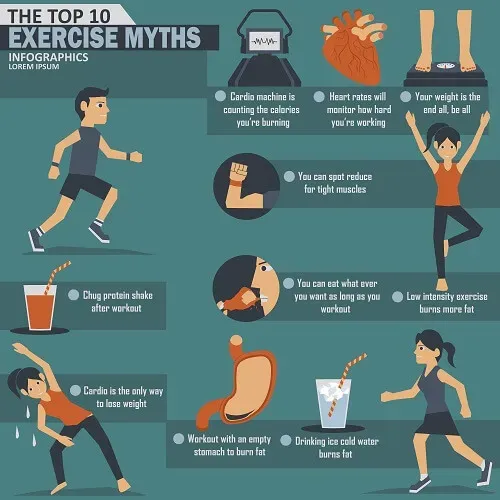Fitness Myths Debunked: Discover the Truth About Exercise
In today’s fast-paced world, the prevalence of fitness myths can often cloud our understanding of health and well-being. From exercise misconceptions that suggest more is always better, to misguided beliefs about protein intake and muscle recovery, the misinformation can lead to frustrating results. It’s crucial to sift through this maze of fallacies and get to the heart of effective fitness practices. This article aims to debunk prominent fitness myths, providing you with the clarity needed to optimize your workout routine and support your holistic fitness approach. By aligning factual insight with actionable tips, we can transform how you view fitness and help pave the way for lasting results.
Navigating the complex landscape of health and fitness can be daunting, particularly with the abundance of misleading narratives surrounding physical activity and nutrition. Commonly referred to as exercise misconceptions, these misleading beliefs often lead individuals down paths that stifle their progress and undermine their goals. For instance, the idea that you must consume excessive protein for muscle growth or that only intense workouts are effective can seriously hinder one’s journey to wellness. In this guide, we’ll clarify these myths and shine a light on the essentials of muscle recovery, gut health myths, and an all-encompassing approach to fitness that truly works.
Understanding Exercise Misconceptions
In the realm of fitness, exercise misconceptions can lead many astray. One prevalent myth is the belief that if you don’t feel sore after a workout, then you haven’t sufficiently challenged your muscles. This notion can be particularly misleading, as muscle soreness is not an official indicator of workout effectiveness. Many factors influence how and when we experience soreness, including workout variety, hydration levels, and individual body responses. As such, non-soreness does not equate to ineffectiveness in a workout; balanced routines are better indicators of progress.
Moreover, another common misconception is the idea that cardio is the only means to achieve weight loss. While cardiovascular exercises indeed burn calories, strength training also plays a crucial role in accelerating metabolism and building lean muscle, significantly contributing to caloric burn, even at rest. Emphasizing a balanced routine that incorporates both cardio and strength training can lead to more efficient results and a healthier relationship with exercise.
The Truth About Protein Intake for Muscle Gain
When it comes to protein intake, many gym-goers believe that piling on protein shakes and bars is the solution to their muscle-building dreams. However, the truth is more nuanced. Not only is excessive protein unnecessary, but it can also place undue stress on the kidney and liver. Recommendations suggest a moderate intake that matches one’s activity level and fitness goals, often ranging from 1.2 to 2.0 grams per kilogram for athletes, but emphasizing healthy sources like legumes, lean meats, and nuts is paramount.
Furthermore, focusing solely on protein overlooks the importance of a balanced diet. Carbohydrates and healthy fats are essential in creating a holistic approach to nutrition that supports muscle recovery, boosts energy, and enhances overall fitness. Therefore, aligning macronutrient intake with overall health goals rather than solely fixating on protein can lead to more significant and sustainable results.
The Importance of Recovery Days in Fitness
Recovery days are often misunderstood, leading many to push through fatigue in the name of dedication. This can be detrimental to long-term progress, as muscles need time to repair and strengthen after vigorous workouts. Adequate rest is equally as essential as exercise; it prevents burnout and injuries, ultimately supporting continual improvement in strength and endurance.
Moreover, incorporating rest days aids not just physical recovery but mental rejuvenation as well. Expecting to perform at peak capacity without giving the body a chance to recover can lead to diminished returns over time. Instead, embracing recovery as a crucial component of fitness can foster a healthier mindset and ensure longevity in one’s fitness journey.
Debunking Gut Health Myths
There’s a prevalent myth that gut health revolves solely around the use of supplements. This misconception overlooks the significant benefits of whole foods that support gut functionality. Fermented foods, high in probiotics, not only provide the beneficial bacteria our digestive system craves but also offer a variety of nutrients essential for overall health. Options such as yogurt, kimchi, and sauerkraut are often more effective than commercial supplements.
Understanding that a balanced diet rich in fruits, vegetables, and fiber is fundamental to gut health is essential. The gut microbiome thrives on diversity; hence the more varied your diet, the healthier your gut can be. Relying on supplements without addressing dietary habits can often lead to unsatisfactory results, reinforcing the importance of food choices over quick fixes.
High-Intensity Workouts vs. Balanced Fitness Approaches
High-Intensity Interval Training (HIIT) often takes the spotlight in fitness discussions, leading many to believe it’s the only path to achieving their goals. This is a myth, as a well-rounded fitness regimen includes a variety of exercise modalities. Low-impact workouts, strength training, flexibility sessions, and even recreational activities can contribute positively to one’s health without the strain that high-intensity can cause.
In essence, a holistic fitness approach encompasses not just high-intensity workouts but also includes mindful practices such as yoga and active recovery. Embracing this diverse range of activities can lead to better overall physical and mental health while also diminishing the risk of overuse injuries.
The Role of Quality Over Quantity in Fitness
Quality over quantity is a fundamental tenet in fitness that is often overlooked. Many believe that spending hours at the gym equates to better results, but this notion can lead to fatigue and disinterest. Instead, focusing on effective workouts that engage various muscle groups and movements can yield far greater benefits in a short amount of time. Prioritizing form, intensity, and overall engagement is what ultimately drives fitness success.
In addition, setting concise, realistic goals can further emphasize the importance of quality in exercise. Adopting a philosophy where you prioritize significant workouts that align with personal goals instead of aiming for unsustainable quantities results in a more enjoyable and effective fitness journey.
Finding Balance in Nutrition and Exercise
Nutrition plays an invaluable role in sustaining an effective fitness regimen, yet many individuals disregard the significance of balance. Often, strict dietary rules and obsessive counting can create a toxic relationship with food. Instead, developing an intuitive eating approach that prioritizes nourishing the body while allowing room for treats can lead to greater overall fitness satisfaction.
Likewise, recognizing that exercise is not solely a means to an end can reshape perceptions of fitness. Finding physical activities that bring joy and satisfaction creates a more sustainable approach to maintaining fitness. Incorporating enjoyable exercises, whether dance, swimming, or hiking, ensures that fitness becomes a lifelong pursuit rather than a temporary phase.
The Impact of Misinformation on Fitness Goals
The plethora of misinformation surrounding fitness today poses significant challenges for individuals looking to achieve their health goals. Many base their exercise routines on unverified claims found on social media, leading to ineffective practices. Distinguishing reliable sources and advocating for science-backed information is crucial to navigate the often conflicting fitness advice.
Moreover, understanding the origins of such misinformation can foster smarter choices. Engaging with credible fitness experts, attending workshops, and relying on evidence-based research can empower individuals to make informed decisions regarding their fitness routines and dietary choices, propelling them toward achieving their personal health milestones.
Embracing Holistic Fitness for Long-term Results
A holistic fitness approach emphasizes the interconnectedness of physical health, mental well-being, and emotional balance. This perspective encourages individuals to forge healthy relationships with exercise and nutrition, recognizing their combined impact on overall wellness. By adopting practices such as mindfulness, stress reduction, and self-care into one’s fitness routine, individuals are likely to experience long-term success and fulfillment.
Additionally, engaging in community activities and supportive fitness groups can enhance the holistic approach toward fitness. Being part of a community offers motivation, accountability, and inspiration, contributing to a well-rounded experience. Embracing a lifestyle that incorporates holistic principles will not just lead to short-term results but cultivate a lasting commitment to health.
Frequently Asked Questions
What are some common fitness myths about exercise misconceptions?
Many people believe that more exercise directly leads to better results, but this is a common misconception. Quality and consistency of workouts are far more important than excessive hours at the gym.
How much protein intake is required for muscle gain?
A common fitness myth suggests you need excessive protein to gain muscle. In reality, around 0.8 grams of protein per kilogram of body weight is sufficient for most people. Athletes might require between 1.2 to 2.0 grams, depending on their activity levels.
Is it true that recovery days are only for the weak?
This is a pervasive fitness myth. Recovery days are crucial for muscle growth and overall performance. Ignoring rest can lead to injuries and hinder progress.
Are gut health supplements the best solution for digestive issues?
Many believe gut health supplements are essential, but this is misleading. A balanced diet rich in whole foods like yogurt, kimchi, and fruits often provides better gut health benefits than supplements.
Do high-intensity workouts guarantee fitness success?
A common misconception is that only high-intensity workouts yield results. A holistic fitness routine that includes various activities, such as strength training and flexibility exercises, can be more effective.
Is it more effective to do cardio than strength training for weight loss?
This fitness myth suggests cardio is superior for weight loss. In reality, a balanced approach that includes both cardio and strength training is essential for optimal results.
Does eating fat make you gain weight?
This myth oversimplifies fat’s role in your diet. Healthy fats are vital for overall health and can aid in weight loss when consumed in moderation within a balanced diet.
Are all carbs bad for your fitness goals?
Not all carbohydrates are detrimental. The myth that carbs are the enemy ignores the fact that healthy carbohydrates, like whole grains and fruits, are critical for energy and overall fitness.
Is immediate muscle soreness a sign of a good workout?
This myth suggests that if you aren’t sore after a workout, you didn’t train effectively. In reality, muscle recovery is key, and soreness isn’t the only indicator of a successful workout.
Can I spot-reduce fat in specific areas of my body?
Spot-reduction is a common fitness myth. Fat loss occurs throughout the body as a whole and cannot be targeted to specific areas through exercise alone.
| Myth | Truth | Key Takeaway |
|---|---|---|
| More Exercise Equals Better Results | Quality and consistency trump quantity; overtraining can hinder progress. | Focus on effective workouts rather than just longer ones. |
| You Need Excessive Protein for Muscle Gain | Moderation is key; balance protein intake with other nutrients. | 0.8g of protein/kg body weight is enough for most adults, higher for athletes. |
| Recovery Days are Just for the Weak | Rest is essential for muscle recovery and performance improvement. | Take rest days seriously to prevent injuries and foster growth. |
| Gut Health Supplements Are Always the Answer | Whole foods often provide better support for gut health than supplements. | Incorporate yogurt, kefir, and fiber-rich foods for gut health benefits. |
| High-Intensity Workouts Are the Only Path | A variety of workouts helps achieve overall well-being and fitness goals. | Combine high-intensity with strength training and flexibility for best results. |
Summary
Fitness myths can significantly derail your fitness journey, leading to confusion and ineffective practices. In our analysis, we have debunked prevalent misconceptions surrounding exercise intensity, protein intake, recovery, gut health supplements, and workout strategies. The key to successful fitness lies in prioritizing the quality of your workouts rather than their duration, balancing your nutritional intake, and giving your body the necessary time to recover. By dispelling these fitness myths, you can approach your fitness journey with clarity and confidence, embracing a holistic and sustainable path to health.
#FitnessMyths #ExerciseFacts #WorkoutTruths #FitnessEducation #TrainSmart








